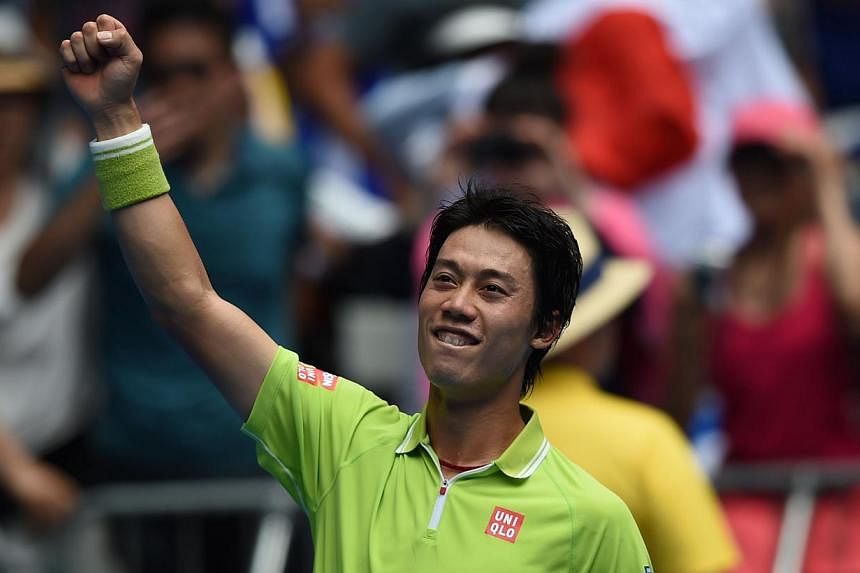Tadahiro Yoshimatsu, 55, rises from his desk in the press room and takes a short stroll. The veteran Japanese writer for the Nikkan Sports News is counting reporters for me. Once, he says, five or six reporters from his nation showed up at the Australian Open. Now, his stroll done, he returns to say: "Over 20 this year. Just in print".
The reason for this change is just entering court No. 16, stalked by a camera, clad in brown shorts, a hairband on his head. It is 1pm and Kei Nishikori has one hour to apply polish to his game.
Lleyton Hewitt's tiny son is hitting the ball with interesting timing and Nishikori waits. Michael Chang, his coach, asks Hewitt Jr if he wants to knock, but the boy is too shy. Instead he hits balls into the crowd. Nishikori smiles. Later, he removes his shirt, and his left shoulder is a criss-cross of tape. Bruised from carrying a continent's hope it would seem.
My particular interest in Nishikori is a product of my geography. As a boy, I grew up idolising a man I never saw play but was privileged to meet. A languid, gentle Indian, now 77, Ramanathan Krishnan's racket wrote tennis verse, to the point where even in 2007, Robert Phillip wrote in The Telegraph that "every Krishnan rally was a thing of great beauty".
The first Asian to reach a Grand Slam semi was a Japanese, Ichiya Kumagai at the 1918 US Open, a feat replicated nine times till 1933, eight times by Japanese players, once by an Indian. Twenty-seven years later, in 1960, Krishnan reached the semi-finals of Wimbledon and then again in 1961, and maybe, in my boyish mind, an Asian man posing with a singles Grand Slam trophy seemed inevitable.
Except now, 53 unfulfilled years have passed and a continent of over 4 billion people now genuflects at the charming feet of the toothy, smiling Nishikori. A golf Major has been won by an Asian man. Hundreds of Olympic golds won by men. But no Grand Slam title by a man, only by that extraordinary woman Li Na. But Nishikori has edged closest. He has got to a final, last year at the US Open. He is a step away but it will take an extraordinary leap.
So many truths and stereotypes, generalisations and cliches have stalked Asian athletes. Too small, too under-powered, too deferential. Nishikori, 25, is only 178cm tall, "very gentle" says a Japanese writer, but not on the court. Out there he, who travelled to America at 13 to find his tennis self, is expressive.
Yoshimatsu tells me that "inside", Nishikori is "very emotional. He doesn't want to lose to anyone". He ventures that the Japanese, not just in sport, tend to "escape risk" but perhaps not Nishikori. He says other Japanese players, if they were down 1-6, 1-5 would turn defensive, but that is not Nishikori's style. "He takes risks on court, but once he leaves the court he's very shy."
With baseball quiet during the Japanese winter, Nishikori, even with his football compatriots performing in this country during the Asian Cup, is possibly, right now, his nation's most observed athlete. Life has changed for him and also for men like Yoshimatsu. For the first time this year the writer went to the Brisbane tournament and will spend an entire tennis month in Australia. Nishikori, whose face constantly adorns the front pages, is worth every expense.
On court, meanwhile, Michael Chang is standing seven feet inside the baseline and serving. Nishikori, on a boxer's light feet, springs forward to hit returns. One, two, 12, 20. Later, as Nishikori advances on short balls to practice hitting winners, Chang dances behind him, a watchful shadow who observes every turn of his protege's hip, every angle of his racket. No one can predict a grand slam title for the Japanese for the alchemy of great champions is unknown. You just sweat, you try, maybe you find.
It is 2pm, the hour is over, and now the world's greatest player has arrived on court. Ever-friendly, he shakes Chang's hand and then Nishikori's. Novak Djokovic has his cap on backwards. He is the world No. 1 and ready for practice. It is his time. It is not yet Nishkiori's time.

